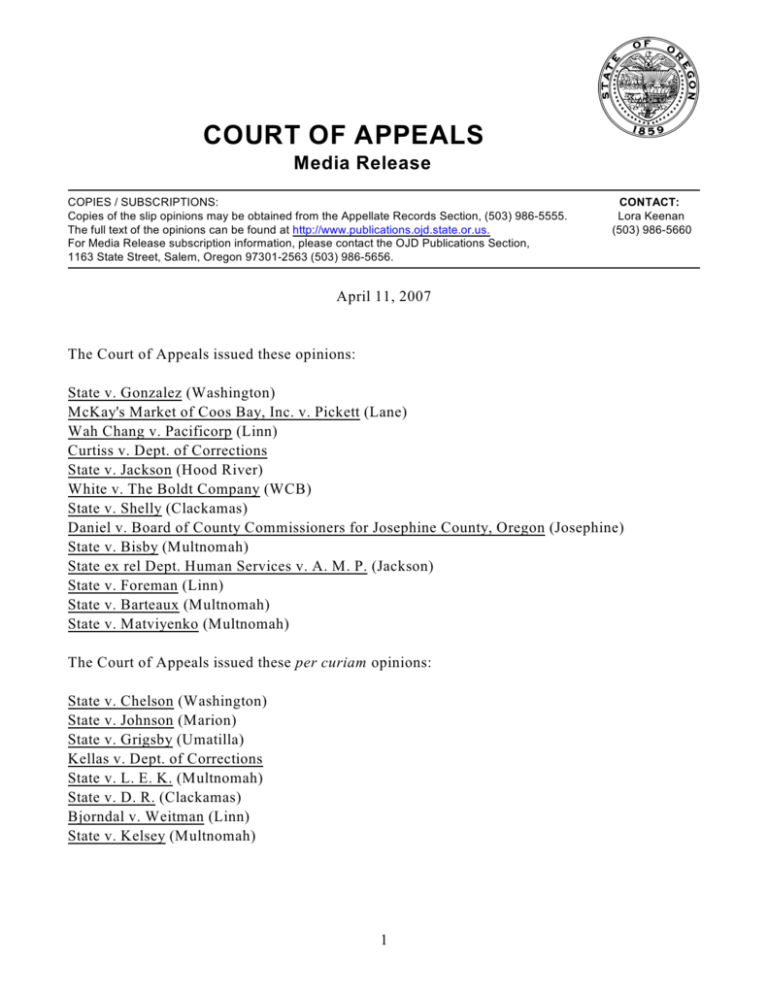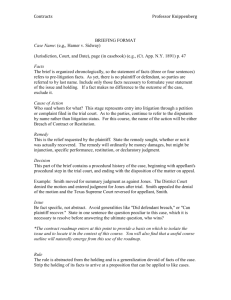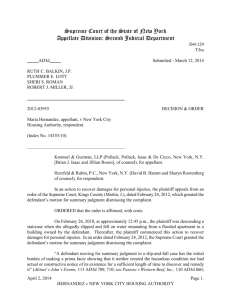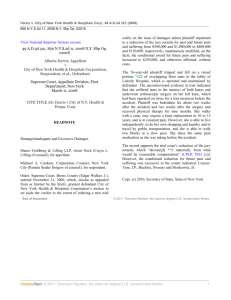
COURT OF APPEALS
Media Release
COPIES / SUBSCRIPTIONS:
Copies of the slip opinions may be obtained from the Appellate Records Section, (503) 986-5555.
The full text of the opinions can be found at http://www.publications.ojd.state.or.us.
For Media Release subscription information, please contact the OJD Publications Section,
1163 State Street, Salem, Oregon 97301-2563 (503) 986-5656.
CONTACT:
Lora Keenan
(503) 986-5660
April 11, 2007
The Court of Appeals issued these opinions:
State v. Gonzalez (Washington)
McKay's Market of Coos Bay, Inc. v. Pickett (Lane)
Wah Chang v. Pacificorp (Linn)
Curtiss v. Dept. of Corrections
State v. Jackson (Hood River)
White v. The Boldt Company (WCB)
State v. Shelly (Clackamas)
Daniel v. Board of County Commissioners for Josephine County, Oregon (Josephine)
State v. Bisby (Multnomah)
State ex rel Dept. Human Services v. A. M. P. (Jackson)
State v. Foreman (Linn)
State v. Barteaux (Multnomah)
State v. Matviyenko (Multnomah)
The Court of Appeals issued these per curiam opinions:
State v. Chelson (Washington)
State v. Johnson (Marion)
State v. Grigsby (Umatilla)
Kellas v. Dept. of Corrections
State v. L. E. K. (Multnomah)
State v. D. R. (Clackamas)
Bjorndal v. Weitman (Linn)
State v. Kelsey (Multnomah)
1
The Court of Appeals affirmed these cases without opinion:
State v. Charron (Multnomah)
Kelley v. Lampert (Malheur)
State v. Heinz (Multnomah)
State v. Waldschmidt (Multnomah)
Duval v. Lunning (Clackamas)
State v. D. T. S. (Multnomah)
State ex rel Dept. of Human Services v. M. M. S. (Union)
Thomas v. Hall (Marion)
Geer v. Hill (Malheur)
State v. Hayes (Multnomah)
State v. Radcliff (Yamhill)
Harris v. Sorensen (Jackson)
Ruiz v. Hill (Malheur)
Brown v. Bartlett (Marion)
Salser v. Bartlett (Marion)
Echols v. Belleque (Umatilla)
Mosley v. State of Oregon (Umatilla)
State v. Jarvis (Lane)
State ex rel Juv. Dept. v. R. C. (Multnomah)
*****
State of Oregon, Respondent, v. Andy Chavez Gonzalez, aka Andy Chaves-Gonzalez, Appellant.
Landau, P. J.
Defendant appeals a judgment revoking his probation. He assigns error to the trial court's
admission of hearsay evidence at his probation revocation hearing. According to defendant, the
admission of that evidence violated his Sixth Amendment confrontation rights as articulated by
the Supreme Court in Crawford v. Washington, 541 US 36, 124 S Ct 1354, 158 L Ed 2d 177
(2004). The state responds that probation revocation hearings are not criminal prosecutions to
which the principles in Crawford apply. Held: Crawford is explicitly based on the Sixth
Amendment, which, by its terms, applies in the context of "criminal prosecutions." A probation
revocation hearing is not a "criminal prosecution" within the meaning of the Sixth Amendment.
Therefore, Crawford does not preclude the admission of hearsay testimony at a probation
revocation hearing in the absence of an opportunity to cross-examine the declarant. Affirmed.
McKay's Market of Coos Bay, Inc., Respondent, v. Faye R. Pickett and Florence Auto Parts,
Inc., Defendants, and JF's Investments, LLC, dba The Market Bin, Appellant. Landau, P. J.
Plaintiff filed this action for declaratory and injunctive relief, claiming that defendant's
operation of a coffee "cart" violates a deed restriction that prohibits building a "building" on the
2
property on which the cart is located and that requires that property to "remain a parking lot."
The trial court concluded that the operation of the coffee cart violates the deed restriction. One
of the defendants appeals, arguing that the trial court should have construed the deed restriction
narrowly in favor of the free use of the property. Held: Defendant dug up portions of the
parking lot, installed utilities, and moved onto the parking lot a structure that takes up two
parking spaces, along with installing curbs and landscaping. The operation of the business
further takes up between one and four additional parking spaces as customers wait in line to
purchase drinks from the cart. The property containing the coffee cart thus does not "remain a
parking lot" as required by the deed. Affirmed.
Wah Chang, Respondent, v. Pacificorp, Appellant. Haselton, P. J.
Defendant appeals the trial court's order granting plaintiff relief from judgment. ORCP
71 B. Originally, plaintiff sought a declaratory judgment declaring that it had no further
obligations under the parties' contract. Plaintiff alleged that the primary purpose of that contract
had been frustrated by an unanticipated event. The trial court granted defendant's motion for
summary judgment, and, subsequently, plaintiff sought relief under ORCP 71 B. In doing so,
plaintiff proffered "newly discovered evidence" pertaining to its claim of "frustration of
purpose" that, according to plaintiff, would change the result of defendant's motion for summary
judgment. The trial court agreed and granted the requested relief. Held: The trial court
correctly determined that plaintiff's "newly discovered evidence" affected the outcome of the
motion for summary judgment. Affirmed.
Daniel Gene Curtiss, Petitioner, v. Department of Corrections, Birdie Worley, Rules
Coordinator, Respondent. Haselton, P. J.
Petitioner seeks review of an administrative rule of the Department of Corrections,
asserting that the rule, concerning credit for time served on prison sentences, exceeds the
department's authority because it contradicts one of the provisions of ORS 137.370(2). ORS
137.370(2)(a) requires the department to credit an inmate with "time that the person is confined"
after arrest. OAR 291-100-0080(3)(g), promulgated by the department to implement ORS
137.370, provides that "[a]n inmate will not receive time served credit for time not confined in
the county jail, such as time spent on house arrest." Petitioner contends that time spent on
pretrial release or home detention after arrest qualifies as "time that the person is confined" after
arrest and that OAR 291-100-0080(3)(g) therefore contradicts ORS 137.370(2). Held: When
viewed in its statutory context, the term "confined," as used in ORS 137.370(2), means
incarcerated and does not encompass pretrial conditional release, including home detention.
OAR 291-100-0080(3)(g) held valid.
State of Oregon, Respondent, v. Louis Eugene Jackson, Appellant. Haselton, P. J.
Defendant appeals a judgment of conviction for robbery in the second degree, ORS
164.405(1)(b), assigning error to the denial of his motion for judgment of acquittal. Defendant
argues that the state's evidence failed to prove that defendant, when he committed the robbery,
3
was "aided by another person actually present." Specifically, defendant contends that his
codefendant was present as a "getaway driver" only and, thus, was not "actually present" for the
robbery as ORS 164.405(1)(b) requires. Held: Defendant's codefendant was in such physical
proximity to the robbery as to be readily capable of assisting defendant in exerting force upon
the victim. Therefore, the codefendant's participation in the robbery was sufficient. Affirmed.
In the Matter of the Compensation of Bradford White, Claimant. Bradford White, Petitioner, v.
The Boldt Company and St. Paul Fire & Marine Insurance Co., Respondents. Armstrong, J.
Claimant seeks review of an order of the Workers' Compensation Board that affirmed an
administrative law judge's denial of his claim for a cervical spine injury. Claimant was injured at
work while moving an 800-pound table. In determining the compensability of claimant's injury,
the board applied a major contributing cause standard of proof, finding that his otherwise
compensable injury combined with a preexisting condition to cause his disability or need for
medical treatment. Held: Under ORS 656.005(24)(a), whether a condition is "preexisting" is
not dependent on a pre-injury history of symptoms but, rather, on whether claimant has been
diagnosed with the condition, or received medical services for the symptoms of the condition,
before the date of the injury. Because the board did not explain how claimant's cervical spine
condition satisfied that statutory definition, the board's decision to apply a major contributing
cause standard of proof, rather than a material contributing cause standard, was not supported by
substantial reason. Reversed and remanded for reconsideration.
State of Oregon, Respondent, v. Crystal Marie Shelly, Appellant. Schuman, J.; Hargreaves, S.
J., dissenting.
Defendant appeals from a judgment of conviction for robbery in the first degree and
burglary in the first degree. She assigns error to the trial court's refusal to permit crossexamination of a witness for the purpose of establishing that the witness had an interest in
currying favor with the prosecution and that, therefore, his testimony might lack credibility. In
particular, defendant wanted to cross-examine the witness about his status at the time of trial as a
probationer exposed to revocation. Held: The trial court erred in not permitting defendant to
cross-examine the witness about his status as a probationer. Reversed and remanded for new
trial.
David H. Daniel, as Sheriff of Josephine County, Oregon, Respondent, v. Board of County
Commissioners for Josephine County, Oregon, Appellant. David H. Daniel, as Sheriff of
Josephine County, Oregon, Respondent, v. James Riddle, James Raffenburg, and Dwight F.
Ellis, County Commissioners of Josephine County, and Josephine County, a political subdivision
of the State of Oregon, Appellants. Schuman, J.
These consolidated appeals stem from a dispute between the Sheriff of Josephine County
(plaintiff) and the county commissioners (defendants) over which party has the authority to
promote individual sheriff's deputies. In the first case (A131487), defendants appeal a judgment
declaring that, although defendants have the authority to set the maximum number of deputies in
4
the sheriff's department and the department's budget, plaintiff has "the legal right to control
promotion/reclassification decisions." In the second case (A131473), defendants appeal a
judgment nullifying county legislation purporting to establish that the sheriff's department must
consist of one undersheriff, one lieutenant, and eight sergeants. Held: Defendants' authority to
fix the compensation of every deputy necessarily gives them the authority to determine how
many deputies will occupy each salary level in plaintiff's department; therefore, the court erred
in the declaratory judgment action to the extent that it concluded that plaintiff has the authority
to increase the number of deputies receiving a particular salary set by defendants. It also erred in
nullifying defendants' legislation. In A131487, judgment vacated and remanded; in A131473,
reversed.
State of Oregon, Respondent, v. Shawn N. Bisby, Appellant. Schuman, J.
Defendant appeals a judgment that modified a sentence that he had fully served. Pursuant
to a plea bargain in two cases, defendant pleaded guilty or no contest to four charges, including
coercion and witness tampering. Defendant stipulated to a 72-month sentence to be imposed on
the coercion conviction with the other sentences to be served concurrently. Defendant later
sought post-conviction relief, arguing that his trial counsel had been inadequate because he did
not tell defendant that the 72-month sentence exceeded the maximum length that could be
imposed on the coercion conviction. The post-conviction court agreed and vacated all of the
sentences. On remand, in an apparent attempt to make the total modified sentences approximate
the original total, the sentencing court reduced the 72-month coercion sentence by 36 months,
increased the witness tampering sentence from 25 to 30 months, and made the two sentences
consecutive, for a total period of incarceration of 66 months. At the time, more than 25 months
had elapsed since defendant had been originally sentenced; thus, the modified sentence for
witness tampering reinstated a sentence that had been fully served and made it consecutive to an
ongoing sentence. On appeal, defendant argues that the court did not have authority to increase
his 25-month sentence for tampering or to make it consecutive to the sentence for coercion
because the tampering sentence had been fully served. Held: The sentencing court erred in
modifying defendant's already-served sentence on his conviction for tampering with a witness
because such a modification was beyond the authority of the sentencing court. Sentences
vacated; remanded for resentencing; otherwise affirmed.
In the Matter of C. R.-J. P., a Minor Child. State ex rel Department of Human Services,
Respondent, v. A. M. P., aka A. M. J., and B. P., II, Appellants. In the Matter of B. N. P., a
Minor Child. State ex rel Department of Human Services, Respondent, v. A. M. P., aka A. M. J.,
and B. P., II, Appellants. In the Matter of K. F. M. P., a Minor Child. State ex rel Department
of Human Services, Respondent, v. A. M. P., aka A. M. J., and B. P., II, Appellants. Ortega, J.
Mother and father appeal from a juvenile court judgment terminating their parental rights
to their three children. Mother has a history of mental illness, and both mother and father have
histories of drug use and criminal activity. At the time of termination, mother had recently been
released from prison and father was incarcerated. The trial court terminated mother's and
father's parental rights based on unfitness, ORS 419B.504. Held: On de novo review, the Court
5
of Appeals reverses termination as to both parents. ORS 419B.504 requires the state to prove
that a parent's conduct or condition has had a seriously detrimental effect on a child. The inquiry
is child-specific and requires the state to make a specific showing regarding the particular
children at issue. Here, the state failed to make such a showing, and therefore the evidence is
insufficient to support termination. Reversed.
State of Oregon, Respondent, v. Robert Allen Foreman, Appellant. Rosenblum, J.
Defendant appeals his conviction and sentence for first-degree sexual abuse and firstdegree sodomy. He argues that the trial court erred in admitting into evidence hearsay
statements made by the three-year-old victim to her mother. Specifically, he contends that there
was no corroborative evidence that he had an opportunity to participate in the conduct alleged.
He also argues that the court committed plain error under the Confrontation Clause by admitting
statements made by the victim to a doctor. Held: The mother's testimony that defendant was at
her grandmother's home--where the victim said the abuse occurred--when she picked the victim
up supported and strengthened the conclusion that defendant had an opportunity to commit the
abuse. Admission of the doctor's testimony was not plainly erroneous. It is not clear that the
victim's statements constituted testimonial hearsay, because a reasonable dispute exists as to
whether the statements were made primarily for purposes of diagnosis and treatment rather than
to assist in a police investigation. Affirmed.
State of Oregon, Respondent, v. Mervin Barteaux, Appellant. Rosenblum, J.
Defendant was convicted of multiple counts of sodomy in the first degree, ORS
163.405(1)(d), unlawful sexual penetration in the first degree, ORS 163.411(1)(c), and sexual
abuse in the first degree, ORS 163.427, based on sexual contacts with his developmentally
disabled adult cousin. He argues that the state failed to present evidence from which a rational
jury could conclude that his cousin was incapable of consent by reason of her mental defect. See
ORS 163.305(3); ORS 163.315(1)(b). Held: The state's expert witness's testimony
demonstrated the necessary link between the victim's mental condition and her incapacity to
consent to sexual contact because it demonstrated that the victim's mental defect rendered her
incapable of exercising judgment to make a choice about whether to engage in sexual contact
with defendant. Based on that testimony, a rational juror could have concluded that the victim
was incapable of consent by reason of her mental defect. Affirmed.
State of Oregon, Respondent, v. Vitaliy V. Matviyenko, Appellant. Rosenblum, J.
Defendant was convicted of driving under the influence of intoxicants. On appeal, he
challenges the denial of his motion to suppress evidence of his Intoxilyzer test results on the
ground that he was denied the opportunity to consult with counsel before deciding whether to
consent to take the test. The state argues that the arresting officer gave him the opportunity to
make any phone calls before taking the test and that defendant waived the right to consult with
counsel by failing to take advantage of the opportunity. Held: The arresting officer did not
provide a reasonable opportunity to consult with counsel. The right to counsel includes the right
6
to confidential communication. After defendant asked to speak with an attorney, the officer took
him to a room with a telephone in which he could not be left alone. Moreover, after telling
defendant that he could make his telephone calls, the officer sat down at the desk and gave no
indication that he would give defendant privacy if he called an attorney. Reversed and
remanded.
[End of Document]
7








